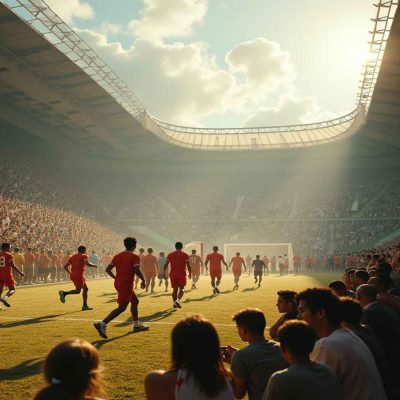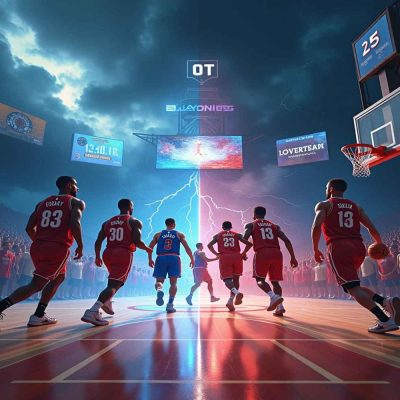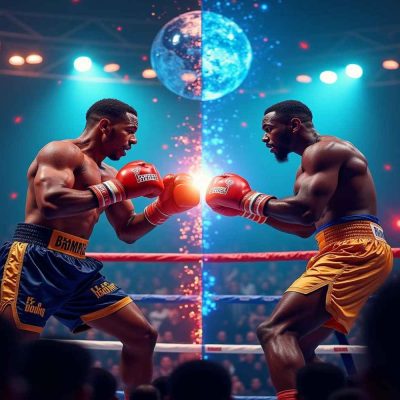The Universal Language of Sport: A Journey Through Competition, Culture, and Human Potential
Sport transcends borders, languages, and generations, uniting people through shared passion and the thrill of competition. At its core, sport is more than just physical activity—it’s a reflection of human ambition, creativity, and resilience. From ancient civilizations to modern mega-events like the Olympics or the FIFA World Cup, sport has evolved into a global phenomenon that shapes identities, inspires communities, and pushes the limits of what we believe is possible.
What Defines a Sport?
The term “sport” often conjures images of athletes sprinting on tracks or teams clashing on fields, but its definition is both nuanced and expansive. According to the Cambridge Dictionary, sport is “a game, competition, or activity requiring physical effort and skill, governed by rules, and enjoyed by participants or spectators.” This broad scope allows for diverse interpretations. For instance, while organizations like the International Olympic Committee prioritize physical athleticism, others, such as the Global Association of International Sports Federations, recognize mind sports like chess or bridge—activities that emphasize strategy over physicality but still foster intense competition.
A Brief History of Sport
The origins of sport stretch back thousands of years. Ancient civilizations used physical contests to train warriors, honor deities, and settle disputes. The Greeks celebrated the Olympic Games as early as 776 BCE, events that combined chariot races, wrestling, and discus throws with religious rituals. Similarly, Mesoamerican cultures played ulama, a ballgame with ritual significance, while medieval Europe saw jousting tournaments that blended combat skill with pageantry.
Modern sport, however, took shape in the 19th century. Industrialization and urbanization created structured leisure time, leading to the standardization of rules and the birth of organized leagues. The establishment of the Football Association in 1863 and the revival of the Olympic Games in 1896 marked pivotal moments, transforming informal pastimes into global spectacles. Today, institutions like FIFA and the International Olympic Committee oversee sports that captivate billions, proving their enduring cultural relevance.
The Many Faces of Sport
Sports manifest in countless forms, each catering to different skills, risks, and audiences. Physical sports—such as football, basketball, and tennis—dominate global attention, requiring a mix of strength, speed, and coordination. These sports thrive on their accessibility; a simple ball and open space can ignite a match anywhere, from Rio de Janeiro’s favelas to Tokyo’s high-school gyms.
For thrill-seekers, extreme sports like skydiving, snowboarding, or big-wave surfing offer an adrenaline-fueled alternative. These activities, often performed in unpredictable environments, test not only physical prowess but also mental fortitude. Platforms like ESPN have popularized events such as the X Games, showcasing athletes who defy gravity and convention.
Then there are mind sports, a category sparking debate. Chess, recognized by the International Olympic Committee as a sport, relies on strategic thinking and psychological endurance. Similarly, competitive gaming (esports) blurs lines between digital and physical realms, drawing audiences comparable to traditional athletics.
The Pillars of Sport: Competition, Skill, and Strategy
At the heart of every sport lies competition—the drive to outperform opponents or surpass personal bests. This rivalry isn’t just about winning; it’s a catalyst for innovation. Consider how basketball’s three-point line or cricket’s T20 format revolutionized their games, balancing tradition with modernity.
Physical skill remains a cornerstone, whether it’s a gymnast’s precision on the balance beam or a soccer player’s deft footwork. Yet, strategy elevates sport beyond brute strength. Coaches and athletes spend years dissecting opponents’ weaknesses, as seen in American football’s playbooks or a cyclist’s calculated breakaways in the Tour de France. The BBC Sport analysis of tennis serves or F1 pit-stop tactics reveals how split-second decisions shape outcomes.
Sport also thrives on community. Local clubs, school teams, and international fanbases create networks of belonging. The roar of a stadium crowd or the camaraderie of a weekend running group underscores sport’s power to connect. Even solitary athletes, like marathoners or climbers, often draw motivation from shared goals and collective admiration.
(This is the first half of the blog post. The second half will explore the societal impact of sport, its role in health and education, and the challenges it faces in a rapidly changing world.)
Sport as a Catalyst for Social Change
Sport has long served as a mirror to society, reflecting its triumphs and struggles while simultaneously driving progress. From Jesse Owens challenging Nazi ideology at the 1936 Berlin Olympics to the Women’s World Cup championing gender equality, athletes and events have repeatedly shattered barriers and sparked conversations far beyond the field. Organizations like the International Olympic Committee have leveraged sport to promote peace, most notably through the Olympic Truce—a modern revival of the ancient Greek tradition that calls for ceasing conflicts during the Games. Similarly, initiatives such as the FIFA Foundation use football to empower marginalized youth, proving that sport can be a tool for education, inclusion, and social mobility.
The rise of Paralympic sports further underscores this transformative power. By showcasing athletes like Tatyana McFadden or Simone Biles, who redefine perceptions of disability and mental health, sport challenges stereotypes and fosters empathy. Platforms like BBC Sport amplify these narratives, highlighting how athletic achievement can shift cultural attitudes and inspire legislative change, such as improved accessibility policies or anti-discrimination laws.
Health, Wellness, and the Role of Sport
Beyond its societal influence, sport is a cornerstone of physical and mental well-being. Regular physical activity reduces risks of chronic diseases like diabetes and hypertension, while also combating anxiety and depression. The World Health Organization recommends at least 150 minutes of moderate exercise weekly—a target easily met through sports like swimming, cycling, or even brisk walking. Schools and communities play a critical role here: programs such as the NFL’s Play 60 campaign or UNESCO’s sport-based curricula encourage youth to embrace active lifestyles early, instilling habits that last a lifetime.
Mental resilience is another often-overlooked benefit. The discipline required to master a tennis serve or the focus needed in archery cultivates cognitive skills transferable to everyday life. Even spectators reap psychological rewards; studies suggest that bonding over a shared team fosters a sense of belonging, reducing feelings of isolation. As ESPN coverage of athlete mental health struggles reveals, the conversation is shifting toward holistic wellness, emphasizing that victory isn’t solely about physical prowess but also emotional balance.
Sport in Education: Building Character and Community
Educational systems worldwide recognize sport’s capacity to teach life skills. Team sports like rugby or volleyball emphasize collaboration, leadership, and accountability—qualities vital in professional and personal realms. Individual pursuits, such as track and field, nurture self-reliance and goal-setting. Programs like the Special Olympics Unified Sports initiative take this further, pairing neurotypical and neurodivergent athletes to foster mutual understanding and respect.
Universities are also tapping into sport’s educational potential. Scholarships enable talented athletes to pursue academics while honing their craft, and research in sports science drives innovations in nutrition, injury prevention, and performance analytics. Institutions like the University of Oregon’s Hayward Field, a Mecca for track enthusiasts, blend athletic excellence with academic rigor, proving that sport and scholarship are not mutually exclusive.
Navigating Modern Challenges: Integrity, Accessibility, and Sustainability
Despite its virtues, sport faces pressing challenges. Commercialization often prioritizes profit over participation, widening gaps between elite leagues and grassroots organizations. Corruption scandals, such as those exposed in FIFA’s administration, erode public trust, while doping controversies tarnish the integrity of competitions. Organizations like the World Anti-Doping Agency (WADA) strive to uphold fairness, but the arms race between regulators and rule-breakers persists.
Accessibility remains another hurdle. While the Paralympics showcase inclusivity, many communities still lack facilities or funding for adaptive sports. Climate change further complicates matters; rising temperatures threaten outdoor events, and carbon footprints of mega-events like the World Cup draw scrutiny. Initiatives such as the IOC’s Sustainability Strategy aim to mitigate environmental impact by prioritizing renewable energy and zero-waste venues, but systemic change requires collective action from fans, athletes, and sponsors alike.
The Future of Sport: Innovation and Inclusivity
As technology reshapes the world, sport evolves in tandem. Advances like VAR in football or Hawk-Eye in tennis enhance fairness, while wearable tech and AI-driven analytics optimize training regimens. Esports, once dismissed as a niche, now rival traditional sports in viewership, prompting leagues like the NBA to invest in virtual competitions. Virtual reality could soon allow fans to “attend” matches from their living rooms, democratizing access for those unable to afford tickets or travel.
Yet, amid these innovations, sport’s essence remains unchanged: it is a universal language spoken through passion, perseverance, and shared humanity. Whether through a pickup basketball game in Nairobi or a chess tournament in Oslo, sport continues to bridge divides and ignite dreams. As we look ahead, the challenge lies not just in preserving tradition but in ensuring that the playing field—physical or digital—is open to all. In the words of Pierre de Coubertin, founder of the modern Olympics, “The important thing in life is not the triumph but the struggle.” Sport, in all its forms, reminds us that the struggle itself holds the power to transform.





